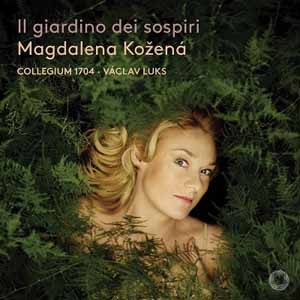This project began as an idea for a staged performance involving a “garden”, the “tragic and joyous fates of ancient heroines”, a “revelation of the labyrinth of human emotions”, the “colorfulness and diversity of Italian Baroque music”, and, of course, the vocal artistry of Magdalena Kožená. The original plan didn’t work out, but what we have here succeeds regardless of the underlying concept. That is, we hear several first-rate if rarely-heard works sung to near perfection and interpreted with all the dramatic nuance and flair we would expect from a knockout theatrical performance. And we still have the Italian Baroque music, the heroines, and the colorful array of human emotions (if not the garden scenery and atmosphere).
You can experience all of those things in just the first piece, Benedetto Marcello’s cantata Arianna abbandonata, where Kožená’s amazing vocal control and expression in the tender, wrenching aria “Come mai puoi…” (How can you leave me weeping…), and mastery of coloratura in the final aria “Che dolce foco in petto…” (I feel a sweet fire in my breast…), permit not even a second for our attention to flag during all of 17 minutes. And did I mention that the orchestral playing is as good in this repertoire–undoubtedly an inspiration to the singer–as you’ll hear anywhere?
Kožená makes the most of a light, lyrical quality to perfectly depict a mood of carefree, happy seduction in the opening aria of Leo’s Angelica e Medoro, carrying through in the sweet and lively following recitative and the flowing concluding aria. Hers is such an ingratiating voice, so pleasing throughout its range, so well-used, the vibrato so natural and focused, the fluidity, the lack of tension–well, I could go on, but you get the idea. This music certainly suits her, and it’s very fine music, all of it, regardless of its relative obscurity on disc.
Most listeners may expect the highlight of the program to be Handel’s Italian cantata Qual ti riveggio, oh Dio (1707), and it is an impressive enough piece of work, with all the expected vocal delights and challenges, great melodies, and of course, owing to Handel’s chosen libretto, more than enough dramatic possibilities to happily engage his performers and audience. But it more than benefits from its company with the aforementioned works. (Incidentally, if you’re wondering what all of these cantatas are about, all the background descriptions of the works, with brief synopses, are included in the notes.) There’s plenty for Kožená to do technically and expressively–and she, and her orchestral partners, leave us, as they say, “wanting more”. I was expecting something good, but not extraordinary. But, even among all the Baroque vocal music recordings of every size and shape and concept occupying the catalog lists, this–and especially Kožená–truly is extraordinary.
































